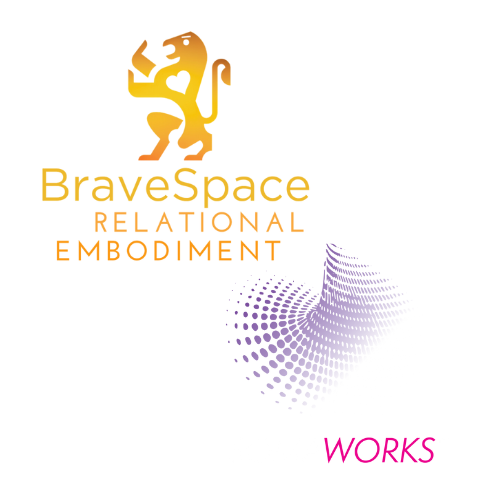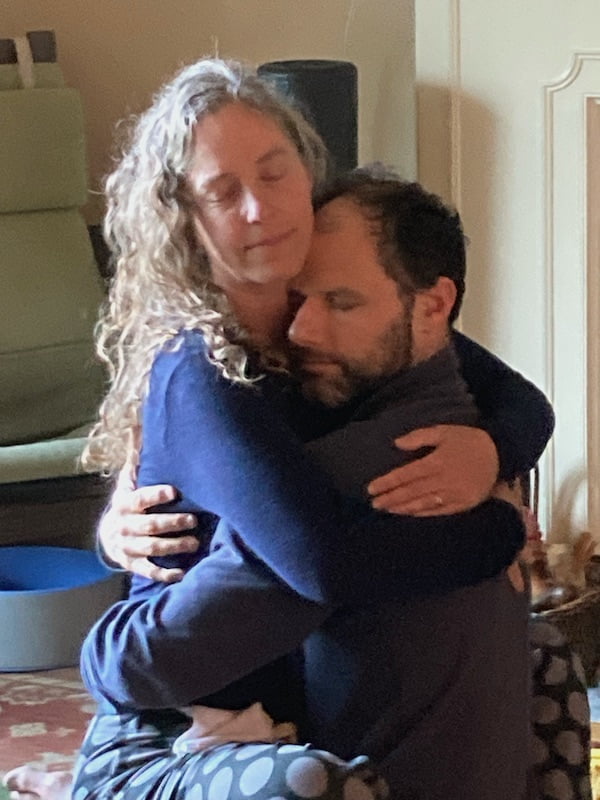Spirit and Eros in Somatic Facilitation
Over the past few months I’ve spent time with diverse groups of somatic facilitators—people who hold spaces centered on the body and consciousness. These are unusual groups of people when compared to those I run into at the grocery store, bank, or even the yoga studio. In these somatic groups I’ve witnessed a tangible ability to self-organize, to witness and express emotional responses in ways that preserve care, and a joyful sense of expressivity. I feel confirmed in my belief that facilitation is not just something that happens in an intentional group, but something that happens in every interaction we have with ourselves, others, and the world. Facilitation is a way of being and a spiritual path.
I grew up in an academic household, received a graduate arts education, and taught in universities. In this secular context I learned to suspend any spirituality or sexuality in my viewpoint. I learned to keep my expressions sterile. Yet, the more I have learned to trust and listen to my body, and the more I have similarly leaned into group dynamics, the more deeply I have come to know that life force is never sterile. Life is inherently spiritual and inherently erotic. Avoiding these aspects only creates separation and alienation, particularly from ourselves.
The purpose of sterilization is to generate safety and control. There is plenty that’s right about this: With various sterilization methods we can consciously and effectively prevent diseases and pregnancy. I have chosen sterilization so that my wife and I do not have more children. If sterilization becomes assumed, however, then life becomes dull: The bread cannot rise, there are no more children, and life loses meaning. Stripped of spirit, we are dispirited. Stripped of eros, we are impotent. We are already destined to die: Safety cannot be the most important priority of life because when it is we lose the magic of actually being alive.
I link spiritual connection to eros because desire—of any sort—is a way I read the life force coming through me. I can navigate and interact with my desire through intellect, but I cannot control my desire itself. I read this as a direct connection to the divine; to that which is larger than my control. This is a somatic experience: I am breathed. I am danced. I am love. I cannot manipulate the truth of my body away with my mind. Please do not misread me here: I am saying that eros is inherent in the body and in human dynamics, not that it should be given control over everything we do. Similarly, spiritual connection gives way to a more dogmatic spiritualism if everything is believed once someone claims it as the work of divine spirit.
I see in our culture today a longing for meaning and connection. I see a need for spirit and eros. These are experiences of the living body that have no substitute in the sterilized world of things. A faster car and a bigger screen won’t do it. So far as I can tell more likes on Instagram won’t either. We need each other, and some well-regulated ways of being with each other. Somatic facilitators are the leaders who can bring others into a living experience of their body’s divinity. Rachel Rickards sold me on her group facilitator training—The Field—by stating on her website that facilitation is not something we do but rather something that we are. I agree completely. Facilitation is not about the logic, the words, or even the principles shared, but rather a way of being within ourselves and with each other. That said, principles and practices are fantastically useful as a framework around which to develop ourselves and our ways of communing. Constitutions are such frameworks. Religious texts are such frameworks. Each arises out of a particular time and context. Today calls for frameworks to help us listen to and trust our bodies so that we can connect with each other and spirit. That is what I am driven to do with the principles of BraveSpace®.
I often ask myself who I think I am to offer such a thing. Certainly I’ve gotten it wrong at times. With so many incredibly capable people in the world, what’s so important about my perspective? There’s lots of ways I can justify; I do have a very unusual background and education. Yet, the deepest truth is that in my search for meeting I simply can’t let this go. As I sit here writing to you about eros, divinity, and meaning, sharing this work is my way of making love with the divine. I ache with desire to contribute, and feel integrity in the work.
Here’s my revised principles of BraveSpace®. I invite your reflections and discussion. I will call soon for a group of people curious to apply these principles in their own lives and facilitation. In the meantime I will be offering them at The Field Festival outside Amsterdam in August and at TRUSTLab, a part of Unison Festival in New Mexico in September.
BraveSpace® is a way of being together that acknowledges the primacy of the body for navigating how we relate, generating an environment safe enough to take the risk of being vulnerable.
Holding BraveSpace® together has fundamental principles:
- Somatic Research: We notice the sensations, emotions, images, and movements that we can perceive in our bodies. We collect this data without jumping to conclusions about its meaning or significance prematurely. Simultaneously, we recognize the truth of the body cannot be manipulated away by our minds.
- De-shaming: We recognize our bodies as nature, both wild and civilized. We suspend judgement in order to openly witness ourselves and each other. While we mindfully choose our actions, we release the need to control our experience, asking of our bodies and each other’s bodies what is being revealed through our perceptions.
- Trans-formation: We recognize that our movements and personalities are comprised of patterns that take form in our bodies and behaviors, and that change in these patterns is often uncomfortable. We are willing to change our form and invite discomfort in order to grow in alignment with purpose, truth, and community. We simultaneously seek to avoid injury to self, other, and world.
- Improvisation: We invite awe and wonder as we inhabit the mysterious gap between knowing and not knowing. We allow truth to emerge through us and recognize power as the ability to be with what is.
- Response-ability: We reposition ourselves in relation to others and the world in each moment seeking our consensual place of belonging. If we become overwhelmed, frozen, or otherwise unable to respond we do our best to speak to it openly and honestly. We do not attempt to control others’ actions in order to avoid shifting our own relationship to the external world, although we may share our perspectives and invite change.
- Heart-Centeredness: We recognize our hearts as portals to spirit and communal consciousness, with the potential to guide us through the limitations of our minds and individual identities. We embody qualities of unconditional love, healing presence, innate harmony, and compassion by calling our attention and energy back to our hearts and to the communal heart.
- Tensegrity: We recognize tensional integrity as a systemic property of our physical bodies in space and also of the interpersonal and spiritual realms we inhabit together. We value and hold the tension of opposites as a necessary and healthy aspect of consciousness, and as a key to improvisational emergence.
- Risk: We recognize life as a place of inherent mortality and choose in BraveSpace the risk of intimacy with ourselves, each other, and the divine, knowing that none of us will complete our journey on this planet alive. We embrace fear without being led by it.
- Eros: We recognize our bodies are charged with a force of life that is inherently erotic and which manifests differently for each of us. We celebrate our pleasure, vitality, and longing by meeting masculine and feminine dynamics within ourselves. In BraveSpace we direct sexual energy that may wish to fixate physically on others into making love with spirit in its many forms.
- Interbeing: We recognize that we are simultaneously individual and collectively conscious beings in concert with an animate world. We attune to and contribute to communal fields of consciousness by noting our own values and preferences, voicing and moving them as they are given to us to share, and being willing to release them to impermanence.


0 comments